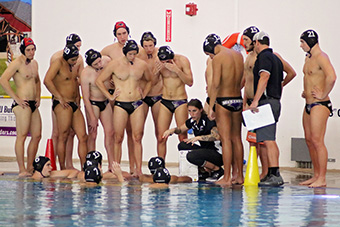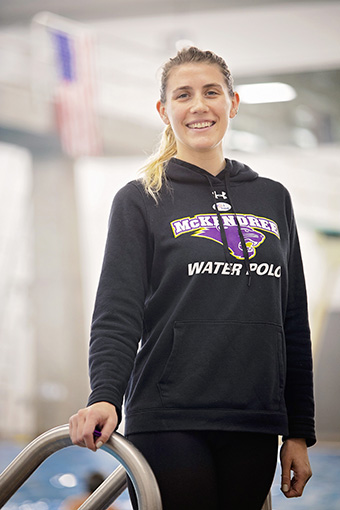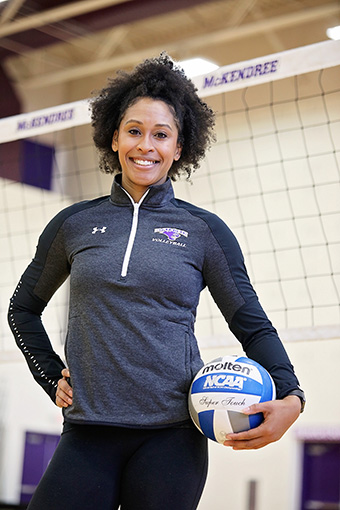Female Coaches Break Barriers
 Women coaching men’s sports. While rare in college athletics, McKendree’s Colleen
Lischwe and Nickie Sanlin have blazed the trail by taking the helm of two men’s programs—men’s water polo and men’s volleyball.
Women coaching men’s sports. While rare in college athletics, McKendree’s Colleen
Lischwe and Nickie Sanlin have blazed the trail by taking the helm of two men’s programs—men’s water polo and men’s volleyball.
The only female head men’s water polo coach in NCAA Division II and part of a small
group of women coaching men’s collegiate sports, Colleen Lischwe was named to the position last June after two successful seasons coaching the McKendree
women’s water polo team.
“I am thrilled to be a part of such an elite group of women leading men’s varsity
programs,” said Colleen. “I have worked really hard to get to where I am today and
I am so grateful for all of the support I have had from fellow coaches and the athletes
themselves. I hope that my being in this position helps to normalize women coaching
men’s teams because my gender has nothing to do with my abilities to coach and coach
well. I want to set a standard for women as leaders and role models in any career
they choose. I hope that the recognition I am receiving for being the only female
currently coaching a men’s NCAA water polo team fades eventually and people won’t
need to call me a “female coach” but a “coach.” In her first season as head coach of the men’s water polo team, Colleen led the team
to the championship at the Mid-Atlantic Water Polo Conference (MAWPC) West region
tournament, which earned the team a bid to the MAWPC tournament in November. For her
exceptional leadership, she was named the Collegiate Water Polo Association Division
II Coach of the Year and the USA Water Polo Midwest Zone’s Monte Nitzkowski Distinguished
Coaching Award recipient.
In her first season as head coach of the men’s water polo team, Colleen led the team
to the championship at the Mid-Atlantic Water Polo Conference (MAWPC) West region
tournament, which earned the team a bid to the MAWPC tournament in November. For her
exceptional leadership, she was named the Collegiate Water Polo Association Division
II Coach of the Year and the USA Water Polo Midwest Zone’s Monte Nitzkowski Distinguished
Coaching Award recipient.
She is not new to men’s water polo. A native of St. Louis, Colleen started by playing
on coed high school and club teams. “There were no girl’s water polo teams in Missouri,
so I played with the boys throughout high school,” said Colleen. “I feel comfortable
coaching the men’s game because that is where I came from. I learned this sport playing
with the boys and it has always felt right coaching men’s teams. I have fun with it
and I like the challenge.”
It was not until she started participating in camps and playing on a women’s team
at Marist College that she fully experienced women’s water polo. She played in two
NCAA women’s championship tournaments before returning to St. Louis to finish her
studies at Saint Louis University. Over the past decade, she has coached both men’s
and women’s high school teams, club programs within the St. Louis area, and Olympic
Development Program camps for the Midwest Zone.
“I have had the opportunity to play with both men’s and women’s teams and coach both
men’s and women’s teams, so I feel uniquely qualified to guide and motivate both groups,”
she said. “I think that men and women absolutely play differently and therefore require
being coached differently. That being said, each individual learns in their own way
regardless of gender, so I always attack the groups I am coaching with a handful of
different opportunities to learn the game.”
As a coach, her proudest moment was the day of the championship game at the MAWPC–West
tournament. “The whole day, start to finish,” she said. “We had just beaten Gannon
University, the only undefeated team in the country, the day before which put us in
that first place game. To see how excited the team was to have accomplished that but
to be able to switch gears and know we still had a job to do made me so happy. I remember
every moment of the championship day and there were no doubts in my mind that we wouldn’t
come out on top. Our team is family, everyone is so tight and trusting of each other,
and to see them focus in on the task at hand and defeat a tough team was amazing.
We climbed a mountain together and are proof that hard work paired with trust, respect,
and a lot of fun will take a team a long way.” Five years ago, Nickie Sanlin was picked to build the new Bearcats’ men's volleyball program and has since led
the squad to 52 victories, including beating Ball State University in the quarterfinal
of the Midwestern Intercollegiate Volleyball Association tournament in 2016.
Five years ago, Nickie Sanlin was picked to build the new Bearcats’ men's volleyball program and has since led
the squad to 52 victories, including beating Ball State University in the quarterfinal
of the Midwestern Intercollegiate Volleyball Association tournament in 2016.
When hired, she was no stranger to the world of men’s volleyball. She had coached
boy’s club volleyball programs in the St. Louis metro area and had been the boy’s
head volleyball coach at Althoff Catholic High School. She also worked summers with
USA Volleyball, coaching High Performance and Junior National teams (which she still
does currently).
Currently the only woman head coach in Division I-II men's volleyball, Nickie considers
herself just as talented as any of the male coaches. “There are certain feminine qualities
I possess that show in my coaching style,” she said. “When I started I didn't look
at myself as a trendsetter or trailblazer. I just wanted to be respected as one of
the 'boys.' One day, a female coach reached out for advice about wanting to coach
men’s volleyball and then it clicked that I have not only represented my university
but other women.”
In addition to coaching the men’s team, Nickie is also the head women’s volleyball
coach at McKendree. Coaching two collegiate teams can be challenging, but Nickie makes
it look easy. “There are not many differences between the men and the women,” she
noted. “They both train the same, need to be nurtured, get homesick, and need a guide
on their journey through adulthood. There is a large misconception that young men
don't have as many needs and feelings as women, but they need just as much if not
more TLC. Going on their journey with me they get to learn from and respect a woman
in a power position. For the women, I hope I can teach them that they are in charge
of their life and are strong enough to tackle anything ahead of them.”

